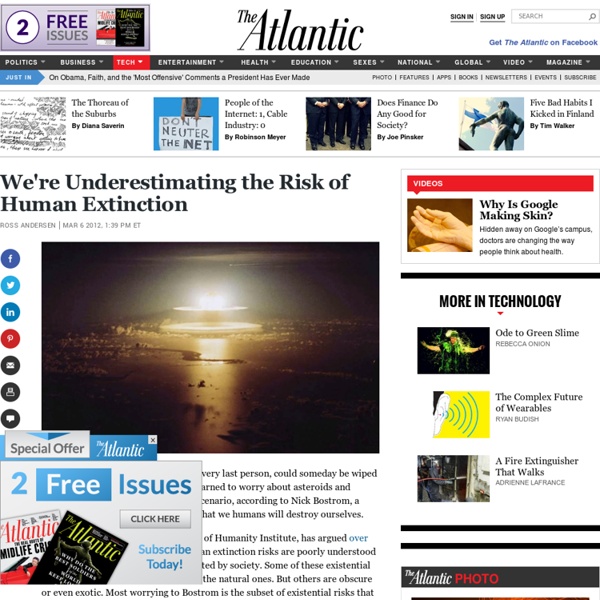We're Underestimating the Risk of Human Extinction

Encyclopedia of Philosophy
Logical Paradoxes
9 Ways Humanity Could Bring About Its Own Destruction
It all started with David Chalmer's various thought experiments concerning qualia and something called philosophical zombies: A p-zombie is essentially a creature that in all ways appears to be conscious, but isn't really conscious. Chalmers proposed a thought experiment where the inputs an outputs of a growing number of neurons in a person's skull are gradually routed into a growing collection of artificial neurons. The person can then try switching back and forth at any level of replacement. Chalmers asks will the person at any point notice any change in their experience of sensations as they keep pressing this switch? If this would happen, if a person's qualia change, then Chalmers says we've overlooked something and consciousness is not being copied or duplicated. The key is that it only depends on a person's subjective experiences. I'm a mechanist and physicalist.
Logical Fallacies
Transhumanism: The Most Dangerous Idea?
"What ideas, if embraced, would pose the greatest threat to the welfare of humanity?" That question was posed to eight prominent policy intellectuals by the editors of Foreign Policy in its September/October issue (not yet available online). One of the eight savants consulted was Francis Fukuyama, professor of international political economy at Johns Hopkins School of Advanced International Studies, author of Our Posthuman Future: Consequences of the Biotechnology Revolution, and a member of the President's Council on Bioethics. In his Foreign Policy article, Fukuyama identifies transhumanism as "a strange liberation movement" that wants "nothing less than to liberate the human race from its biological constraints." Human liberation from our biological constraints began when an ancestor first sharpened a stick and used it to kill an animal for food. What is a human capacity anyway? Our ancestors had no wings; now we fly. Let's take their over-the-top scenario down a notch or two.
An Illustrated Book of Bad Arguments
Bostrom Responds to Fukuyama’s Assertion that Transhumanism is World’s Most Dangerous Idea
Nick Bostrom (Sept 10, 2004) “What idea, if embraced, would pose the greatest threat to the welfare of humanity?” This was the question posed by the editors of Foreign Policy in the September/October issue to eight prominent policy intellectuals, among them Francis Fukuyama, professor of international political economy at Johns Hopkins School of Advanced International Studies, and member of the President’s Council on Bioethics. And Fukuyama’s answer? Transhumanism, “a strange liberation movement” whose “crusaders aim much higher than civil rights campaigners, feminists, or gay-rights advocates.” More accurately, transhumanists advocate increased funding for research to radically extend healthy lifespan and favor the development of medical and technological means to improve memory, concentration, and other human capacities. According to transhumanists, however, the choice whether to avail oneself of such enhancement options should generally reside with the individual.
Paralogical Thinking | Science and Nonduality
In this article standup philosopher Tim Freke articulates the nature of ‘paralogical’ thinking, which is the foundation of the philosophy and practices he shares to guide people to a ‘deep awake’ state. The need for paralogical thinking arises from an important insight. Life is profoundly paradoxical. I’ve already mentioned in passing the paradox that on the surface of life we live in a world of separate things, but at the depths all is one. I want to focus on one particular paradox that scientists have found informs reality on a very deep level. So is light a wave or particles? This is all very hard to understand, so don’t be surprised if you feel bamboozled. If you think you can talk about quantum theory without feeling dizzy, you haven’t understood the first thing about it. THE GLORIOUS BOTH/AND The quantum physicists found that, on a deep level, reality has to be understood as inherently paradoxical. Logical thinking is either/or thinking. Paralogical thinking is both/and thinking.
Related:



